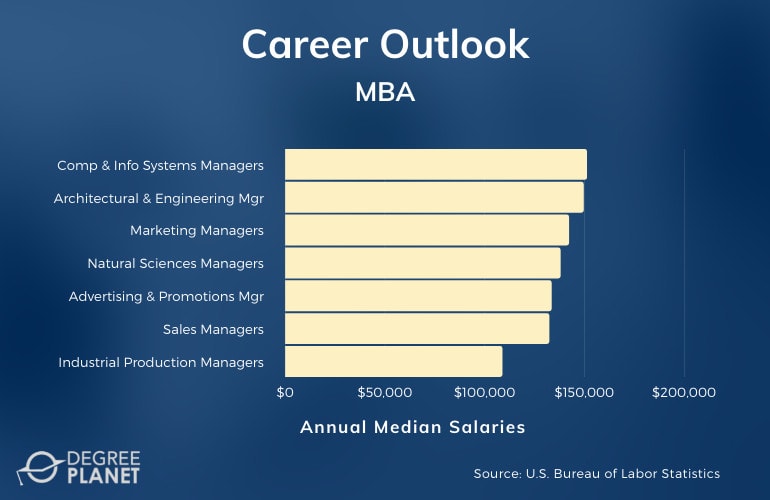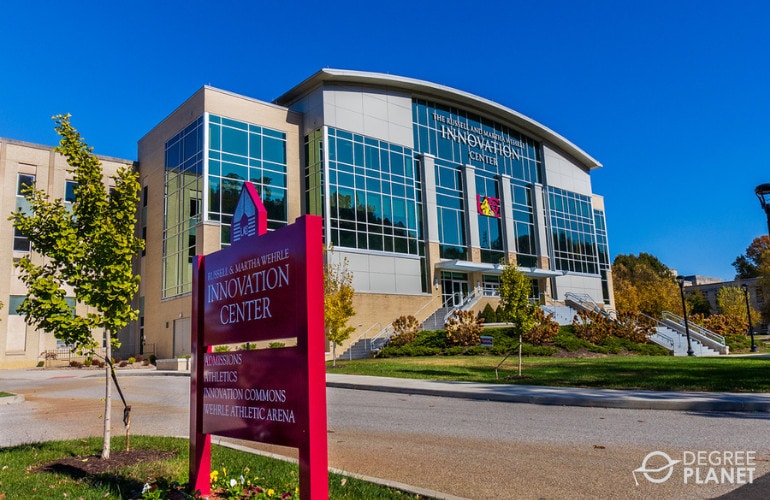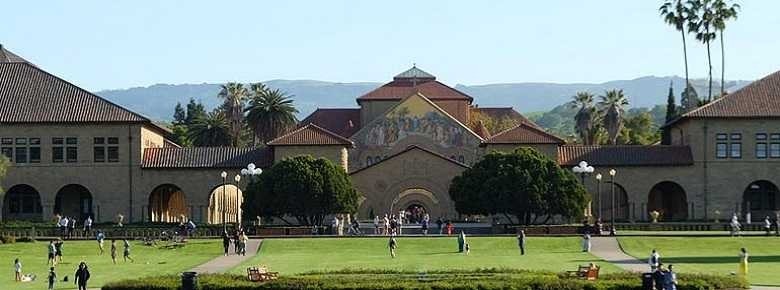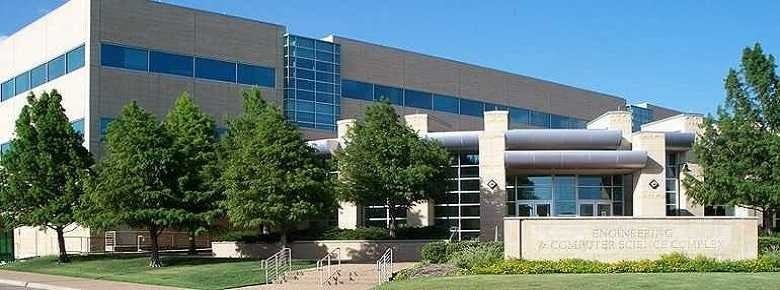An MS MBA dual degree program enables you to earn a Master of Business Administration along with a Master of Science in your chosen field.

Being an effective leader is a highly sought-after skill, along with having specialized knowledge in science or technology. Receiving formal training in both can open up more career opportunities, and the MS MBA dual degree has evolved to meet this need.
Editorial Listing ShortCode:
If you’re looking for more flexibility with your graduate studies, much like with bachelor and master degree combined programs, many credible institutions offer the option to pursue combined masters programs online or on campus.
MS MBA Dual Degree Programs

Dual degree programs allow students to earn two different degrees at the same time. With an MS/MBA dual degree, students receive a Master of Science degree as well as a Master of Business Administration.
Because there are several shared classes, dual MS MBA or STEM MBA programs can be finished in as fast as 2 to 3 years. Even with the heavier course load, MS/MBA dual degrees are becoming more popular because people want to gain expertise in both fields. Many job roles also involve an overlap of the two, such as biotechnology startup managers and engineering directors.
The MBA component of most MS/MBA programs feature classes with topics such as entrepreneurship, accounting, teamwork management, and more. On the other hand, the coursework for the MS component varies widely based on the specific MS degree.
Select the program that most interests you to jump to that section of the guide:
- MBA / M.S. in Biotechnology
- MBA / M.S. in Computer Science
- MBA / M.S. in Engineering Sciences
- MBA / M.S. in Environment and Resources
- MBA / M.S. in Information Technology and Management
You may want to explore your options to decide which program is right for you.
MBA / M.S. in Biotechnology

An MBA/MS in Biotechnology deepens students’ knowledge of the life sciences while training them to be innovative business leaders.
With this dual degree, you can stand at the intersection of finance, science, technology, and research. You can gain a thorough understanding of how to run science-based organizations, from investments and funding to procedures for clinical research.
Editorial Listing ShortCode:
With this training, professionals often end up in leadership positions in the healthcare industry. They may also start new biotechnology products and companies, go into consulting and advising, or become investors and analysts who specialize in the biotechnology market.
Standard courses in an MBA/MS in Biotechnology program cover topics like molecular biology, cellular biology, and biochemistry. You’ll also study accounting, corporate finance, economics, and other business classes. Some schools even offer this dual master’s degree online, only requiring students to meet in-person for laboratory work.
MBA / M.S. in Computer Science

A dual MBA/MS in Computer Science degree can prepare students to become leaders, entrepreneurs, and senior strategists in technology companies.
It delves into advanced areas of computer science, with students eventually creating applications or conducting research projects. They can then take these technical concepts and apply them to the broader business landscape.
So many of today’s major innovations start out with technology, which is why MBA/MS in Computer Science graduates are at an advantage for pursuing impactful roles. They may work in product management, financial technology, and even entrepreneurship and venture capital.
Editorial Listing ShortCode:
There are online and on-campus programs available for MBA/MS in Computer Science degrees. You’ll likely take classes in specialized computer science topics, such as algorithmic analysis, artificial intelligence, and computer system architecture.
Your coursework will also be rounded out with business classes on marketing management, organizational structure, operations management, and more.
MBA / M.S. in Engineering Sciences

Another emerging dual degree is the MBA/MS in Engineering Sciences. The emphasis here is on general management skills together with an in-depth understanding of design and engineering.
Graduates of this dual degree learn to design not only technological products and services but also business models and organizational strategies. Many are poised to take the lead in companies when it comes to decisions about product innovation.
Editorial Listing ShortCode:
A standard path for those with an MBA/MS in Engineering Sciences would be to take on leadership roles in established technology companies. They might become product managers, lead analysts, and chief technology officers. Alternatively, they may also start their own ventures.
This dual degree program has a well-rounded mix of classes, covering topics like economics, leadership communication, technology management, data science, and product development. It’s possible to take this dual degree either online or on campus, depending on the school.
MBA / M.S. in Environment and Resources

AN MBA/MS in Environmental Sciences is an interdisciplinary program that involves business management, environmental research, economics, and statistics.
It can produce environmental analysts and strategists as well as business leaders who have a good grasp of environmental issues. Because the scope can be quite broad, students can often specialize in a specific area of environmental science, from policy interventions to sustainable business practices.
Editorial Listing ShortCode:
Graduates may build their careers in consulting, environmental management, science and research, nonprofits, or government organizations. Aside from traditional on-campus programs, many schools are offering this dual degree in hybrid or online formats.
Course topics that you can expect to take include financial management, strategic sustainability, accounting for managers, and other business-related courses. You can also take more specialized courses in areas like environmental management, environmental biology, and energy resources.
MBA / M.S. in Information Technology and Management

One of the more common dual degree graduate programs is an MBA/MS in Information Technology. With the rise of IT across all industries, there’s greater demand for leaders and managers with strong technical proficiency.
This dual degree starts with a generalist foundation on how businesses are run, from business law and ethics to marketing concepts and economics. As a whole, you can learn to pinpoint business problems and make strategic decisions from a leadership position.
Editorial Listing ShortCode:
The program also includes specialized information technology classes, with topics such as computer security, enterprise infrastructure, and data science. Due to their training, graduates can become adept at managing IT teams, solving issues with information systems, and guiding application development.
Some professionals with an MBA/MS in Information Technology dual degree work as management consultants, senior system analysts, and chief technology officers. Many accredited schools offer the option to earn this dual IT / business administration degree online as well as on campus.
MBA Careers & Salaries

Getting an MBA degree can potentially qualify you for senior and leadership roles and give you a competitive edge. There are a variety of career choices available to those with an MBA degree. Graduates can be found in a variety of industries, from advertising and marketing to technology and science.
Aside from taking on a traditional management role, graduates may also become management consultants, investors, and entrepreneurs. According to the Bureau of Labor Statistics, the median wage for management occupations is $102,450.
| Careers | Annual Median Salaries |
| Computer and Information Systems Managers | $159,010 |
| Architectural and Engineering Managers | $152,350 |
| Natural Sciences Managers |
$137,900 |
| Marketing Managers | $135,030 |
| Sales Managers |
$127,490 |
| Advertising and Promotions Managers | $127,150 |
| Industrial Production Managers | $103,150 |
| Medical and Health Services Managers |
$101,340 |
| Top Executives | $98,980 |
| Management Analysts | $93,000 |
The exact salary you’ll receive will depend on a number of factors, such as your employer, industry, location, and previous experience.
The Bureau of Labor Statistics also projects significant job growth for a number of management occupations. For example, employment for medical and health service managers is projected to grow 28% over the next ten years. Other management roles with a high growth rate include financial managers (17% job growth) and computer and information systems managers (16%).
Pros and Cons of Dual-Degree MBA and MS Programs

There are a number of pros and cons to pursuing MBA MS dual degree programs.
Here are some of the pros:
- More career options. Because you’re pursuing two degrees rather than only one, you’ll likely have access to a greater variety of job opportunities.
- Unique skill set. Receiving combined MBA and MS training in your field can equip you with skills that aren’t as widely available.
- Potentially higher earnings. Graduates of dual MBA MS programs may see an increase in their salary as they qualify for more senior or leadership roles.
- Wider professional network. You can get exposure to peers, professors, and valuable industry contacts across several industries, especially since MBA/MS programs often have work placements.
- Two degrees in less time. A dual MBA/MS program takes less time to earn two degrees than if you were to complete both degrees separately.
On the other hand, here are some of the cons:
- Heavier coursework. A dual MBA/MS degree can take up to 80 credits, and you’ll be enrolling in more classes than if you were to earn a single degree.
- Higher tuition fees. Because you’ll have more credit hours, the tuition fees will also be higher.
- More time than a regular degree. It takes longer to finish a dual MBA/MS program in comparison to earning a single graduate degree.
- More competitive admissions. To get accepted, you often have to apply separately to both of the school departments involved.
- Less flexibility in terms of schedule. Although there are part-time MS/MBA programs, some schools only accept students who can be committed full-time.
All of these pros and cons may be worth considering if you’re thinking about whether a dual MBA/MS degree would be right for you.
Dual Masters Degree Admissions Requirements

Here are some common admission requirements for a dual master’s degree program:
- Official transcripts. Schools generally ask for transcripts from all undergraduate and graduate institutions you’ve attended.
- Resume or CV. Many MBA programs require you to have 2 to 4 years of work experience.
- Recommendations. You’ll likely have to submit 2 or 3 recommendations from professional and academic references.
- Essay. This is usually your opportunity to describe why you’re interested in applying to the program.
On top of these, some schools may request GMAT or GRE scores in your application. You may also have to submit two applications, one for each graduate degree.
MS MBA Programs Accreditation

When you’re trying to decide on an MS MBA program, it’s beneficial to check if a prospective college or university is accredited. Regional accreditation is awarded to schools that meet certain educational standards.
Editorial Listing ShortCode:
Getting your MS MBA degree at an accredited school has a lot of benefits. Aside from receiving a quality education, you’ll often find it easier to get government-approved financial aid. Many employers will also consider a degree as valid only if it comes from an accredited school. To check if your program is accredited, you can visit the US Department of Education’s database of schools.
Financial Aid and Scholarships

If you need assistance covering the cost of your MS/MBA program, you may be able to qualify for financial aid to help lighten the load.
Although graduate students don’t always have the same options as undergraduates, it’s still possible to get access to government assistance. You can determine your eligibility by filling out the Free Application for Federal Student Aid (FAFSA).
Some forms of financial aid for graduate students include grants and loans. With loans, you can borrow up to a certain amount of money every year for tuition, and you’ll repay it back once you graduate. On the other hand, grants don’t need to be repaid.
There are also multiple scholarships available for MBA MS graduate students. You can typically find a list of possible scholarships on school websites. In addition, some employers also offer tuition assistance programs, especially if your current work is closely related to the dual degree you’re pursuing.
MBA or MS, Which Is Better?

Both Master of Business Administration (MBA) and Master of Science (MS) degrees can offer a lot of benefits, but whichever one is better for you depends on your goals, interests, career plans, and more.
Here’s a key difference between the professionals who choose an MBA and those who choose an MS:
- Master of Science: An MS might be a better fit for professionals who would rather focus on a specific technical discipline, such as finance or engineering.
- Master of Business Administration: Professionals who are hoping to explore various industries and acquire business leadership skills might be more suited for an MBA.
Still, some professionals opt to earn both MS and MBA degrees because they want the benefits of both.
Can I Do MS and MBA at the Same Time?

Yes, MS and MBA degrees can be earned at the same time. Although you can juggle these two programs separately, it’s often convenient to pursue a dual degree program.
A dual MS/MBA program already has an integrated curriculum, so you can take a mix of MS and MBA classes every semester. There are also classes that are a hybrid of both, such as business classes focusing on a technical specialty.
A dual MS MBA degree program will take longer to complete than a single graduate program, but you can often finish both degrees more quickly than if you were to earn each one separately.
What Is an MS MBA Dual Degree?

An MS MBA dual degree is a graduate-level program where you’ll receive two degrees: a Master of Science and a Master of Business Administration.
For your Master of Science, you can choose from specific degrees, such as computer science, biotechnology, engineering, finance, and data science. With an MS MBA dual degree, you can delve deep into an industry, from the technical aspects involved to the overall business operations.
Many MS MBA degree holders are equipped to run specialized projects and organizations because they can combine domain knowledge with overall business acumen.
What Can You Do with an MS/MBA Joint Degree?

An MS/MBA degree can open up many job opportunities in a variety of industries, depending on your area of specialty.
Many MS/MBA graduates enter senior or leadership roles in their respective fields. They might become product managers, top executives, consultants and advisors, and research directors. Alternatively, they may also launch their own business ventures or participate in venture capital and investing.
Editorial Listing ShortCode:
Because a joint degree allows for much flexibility, MS/MBA graduates can be found in various work settings. They may work for startups, research laboratories, large established companies, and even government organizations.
How Long Does It Take to Get a Dual MS MBA Degree?

A dual MS/MBA degree typically requires up to 50 to 80 credit hours. The usual single masters degree consists of 30 to 60 credit hours.
Most master’s degrees can be finished in 1 to 2 years full-time, but a dual MS/MBA degree will likely take 3 years, depending on your program and concentration. If you enroll part-time, it will often take you longer to complete your degrees.
Many dual MS/MBA degrees require you to study year-round since there may be practicums or work placements during summer semesters.
What’s the Difference Between MBA vs. MS Programs?
MBA and MS programs have their own areas of focus. Here are some differences between the two:
- Master of Business Administration: An MBA focuses on practical business skills, such as finance, marketing, operations management, and more. Many MBA programs typically require at least two years of work experience.
- Master of Science: An MS focuses on technical skills, with classes such as statistics, data analysis, product development, or biology. MS programs are generally more open to fresh college graduates.
An MBA MS joint degree brings these two together for students who want to gain skills in complementary fields of study.
Is an MBA/MS Dual Degree Worth It?

Yes, an MBA/MS dual degree is worth it for many students. Earning graduate degrees often results in increased salary potential and greater access to more senior-level roles. According to the Bureau of Labor Statistics, both management and science roles are estimated to create hundreds of thousands of new jobs over the next ten years.
In particular, management roles tend to have some of the highest salaries compared to the average wage for other fields. At the same time, there’s rising demand for expertise in science and technology, especially as more companies become committed to research and innovation.
Universities Offering Master of Science and MBA Dual Degree Programs
Methodology: The following school list is in alphabetical order. To be included, a college or university must be regionally accredited and offer degree programs online or in a hybrid format.

Carnegie Mellon University offers two dual degree programs for those interested in a Master of Science and a Master of Business Administration. The options are the MBA and Civil and Environmental Engineering program and the MBA and Software Engineering program. Those interested in pursuing a dual degree must submit GRE or GMAT test scores and be accepted into both degree programs they are interested in.
Carnegie Mellon University is accredited by the Middle States Commission on Higher Education.

Georgia Institute of Technology offers a dual degree program for students interested in receiving an MBA and an MS degree of their choice. Students must complete 54 credit hours to graduate. Those interested in the program must already be studying for a Master of Science degree before applying for the MBA degree.
The Georgia Institute of Technology is accredited by the Southern Association of Colleges and Schools Commission on Colleges.

Harvard University offers a Master of Science in Engineering and a Master of Business Administration dual degree program. It can typically be completed in two years and requires a final capstone project to graduate. Applicants must submit an admissions essay, recommendations, and test scores for both programs before completing an interview.
Harvard University is accredited by the New England Commission of Higher Education.

Indiana University offers a dual degree program for those interested in a Master of Business Administration and a Master of Science degree. To graduate, students must complete 66 credit hours. Those interested in the program must first apply to the Master of Business Administration program before submitting a second application.
Indiana University is accredited by The Higher Learning Commission.

John Hopkins University offers a Master of Science in Biotechnology and Master of Business Administration dual degree program. Students must complete 31 different courses to graduate. Those interested in the program may apply online through the school’s website with copies of their official transcripts and test scores.
The Johns Hopkins University is accredited by the Middle States Commission on Higher Education.

Rockhurst University offers a Master of Business Administration and Master of Science in Data Analytics dual degree program. Students must complete 48 credit hours to graduate. Those interested in the program must submit an application to either the MBA or the MS program before submitting a professional resume, transcripts, and test scores.
Rockhurst University is accredited by the Higher Learning Commission.

Stanford University offers a dual degree program for those interested in a Master of Business Administration and an additional degree. The program offers three Master of Science options: MS in Computer Science, MS in Electrical Engineering, or MS in Environment and Resources. Applicants must submit GMAT or GRE test scores.
Stanford is accredited by the Western Association of Schools and Colleges Senior College and University Commission.

Stony Brook University offers three dual degree programs for those interested in receiving a Master of Business Administration and a Master of Science. Students may choose between Computer Science, Mechanical Engineering, or Biomedical Engineering degrees. Each program requires the students to apply and be accepted into both programs while indicating they are interested in a joint degree.
Stony Brook University is accredited by the Middle States Commission on Higher Education.

The University of Pennsylvania offers a Master of Business Administration dual degree program. Those looking to also complete a Master of Science program may study Medicine, Nursing, Social Work, Engineering, or Education. Those interested in a dual program may apply for it when first applying to the school or during their first year of study.
The University of Pennsylvania is accredited by the Middle States Commission on Higher Education.

The University of Texas–Dallas offers a Master of Science and Master of Business Administration dual degree program. Students must complete the required credits from one program while maintaining a GPA of 3.0 or higher before working on the other. An application for the second program may be submitted at any point during their time at the school.
The University of Texas at Dallas is accredited by the Southern Association of Colleges and Schools Commission on Colleges.
Getting Your MS MBA Dual Degree Online

If you’re passionate about leading science-based organizations or integrating scientific and business insights, then an MS MBA dual degree might be the next step for furthering your career.
A joint degree may open new doors for you and can speed up your learning, allowing you to earn two degrees together. You can also build a wider professional network along the way.
As programs are becoming more flexible, you can generally opt for an on-campus, hybrid, or fully online MS/MBA degree program. To get started, you can check out dual graduate degree programs from accredited schools and explore your options.

